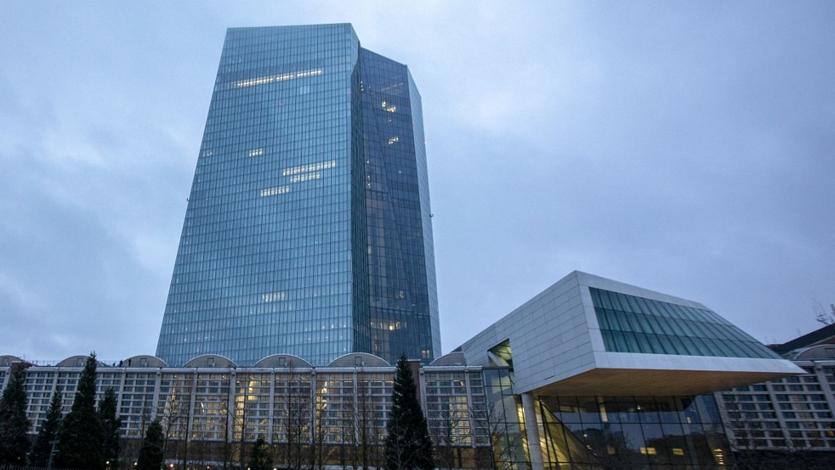 The European Central Bank building in Frankfurt am Main, western Germany, is pictured on Feb 3, 2022. (ANDRE PAIN / AFP)
The European Central Bank building in Frankfurt am Main, western Germany, is pictured on Feb 3, 2022. (ANDRE PAIN / AFP)
FRANKFURT - The European Central Bank raised its key interest rates by an unprecedented 75 basis points on Thursday and signaled further hikes, prioritizing the fight against inflation even as the bloc's economy is heading for a likely winter recession.
With inflation at a half-century high and approaching double-digit territory, policymakers are worried that rapid price growth could become entrenched, eroding the value of household savings and setting off a hard-to-break wage-price spiral.
Following up on its July rate hike, the ECB raised its deposit rate to 0.75 percent from zero and lifted its main refinancing rate to 1.25 percent, their highest levels since 2011, with further moves anticipated in October and December.
The bank sees the euro zone economy expanding by 3.1 percent this year and 0.9 percent in 2023. While this year's growth projection was lifted a touch, it was lowered sharply for 2023
"Price pressures have continued to strengthen and broaden across the economy and inflation may rise further in the near term," the ECB said in a statement.
"This major step frontloads the transition from the prevailing highly accommodative level of policy rates towards levels that will ensure the timely return of inflation to the ECB’s 2 percent medium-term target," the ECB added.
Policymakers had for weeks oscillated between a 50 and a 75 basis-point increase, but another jump in both headline and underlying inflation appears to have settled the debate as figures indicate that price growth is now seeping into the broader economy, making it even harder to root out.
READ MORE: ECB policymakers make the case for a big rate hike
Indeed, the ECB raised its inflation projections once again, lifting the 2023 outlook to 5.5 percent from 3.5 percent and putting the 2024 rate at 2.3 percent, above its 2 percent target.
Markets were little surprised, however, as investors had already priced a more than 80 percent likelihood of a 75 basis-point move, even if economists polled by Reuters were more evenly split, showing only a slight majority expecting the larger move.
Despite the frontloading, further rate hikes are likely, the ECB said.
"Over the next several meetings the Governing Council expects to raise interest rates further to dampen demand and guard against the risk of a persistent upward shift in inflation expectations," the ECB added.
Serious
Going into the meeting, conservatives feared that anything other than an outsized move would signal that the ECB was not serious about its inflation-fighting mandate - officially its sole objective.
That risked pushing up already high long-term inflation expectations, which would signal a loss of confidence in the ECB and raise questions about the bank's inflation-targeting framework.
Timid action also risked weakening the euro and boosting inflation further through more expensive energy imports.
Markets were little surprised, however, as investors had already priced a more than 80 percent likelihood of a 75 basis-point move
The euro has been languishing around parity against the dollar for weeks, not far from a two-decade low hit earlier this month.
That means more expensive exports of everything from oil to cars, which then raises prices for consumer.
ALSO READ: Eurozone's inflation rate rises to record high
Policymakers have also made the case for frontloading rate hikes partly to send a strong signal about the central bank's inflation-fighting commitment and partly to get most of the hikes done before the onset of a recession becomes evident.
With high energy prices sapping purchasing power, a downturn is essentially inevitable. However, monetary policy is mostly powerless against a supply-shock driven downturn, firming the argument for hikes even if the economy suffers.
Some policymakers are now openly talking about a recession, and the ECB's new projections also show sharply lower growth in the coming years.
Still, a shallow recession may even be useful, some argued, as the bloc's labor market is increasingly tight and a downturn could provide relief to firms now struggling to find workers.
The bank sees the euro zone economy expanding by 3.1 percent this year and 0.9 percent in 2023. While this year's growth projection was lifted a touch, it was lowered sharply for 2023.
READ MORE: ECB hikes faster than flagged in race to tame inflation


